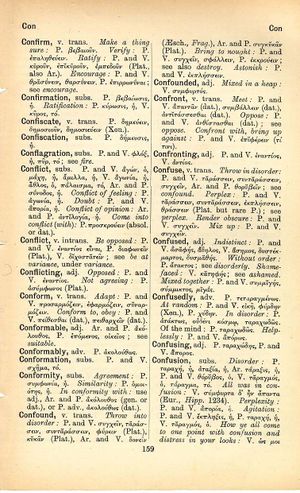confusion: Difference between revisions
Οὕτως γὰρ ἠγάπησεν ὁ Θεὸς τὸν κόσμον, ὥστε τὸν Υἱὸν τὸν μονογενῆ ἔδωκεν, ἵνα πᾶς ὁ πιστεύων εἰς Αὐτὸν μὴ ἀπόληται ἀλλ᾽ ἔχῃ ζωὴν αἰώνιον → For God so loved the world that he gave his only begotten Son that whosoever believeth in him should not perish but have everlasting life (John 3:16)
(CSV3) |
m (Woodhouse1 replacement) |
||
| Line 1: | Line 1: | ||
{{Woodhouse1 | {{Woodhouse1 | ||
|Text=[[File:woodhouse_159.jpg|thumb|link={{filepath:woodhouse_159.jpg}}]] | |Text=[[File:woodhouse_159.jpg|thumb|link={{filepath:woodhouse_159.jpg}}]] | ||
===substantive=== | |||
[[disorder]]: [[prose|P.]] [[ταραχή]], ἡ, [[ἀταξία]], ἡ, [[Aristophanes|Ar.]] [[τάραξις]], ἡ, [[prose|P.]] and [[verse|V.]] [[θόρυβος]], ὁ, [[verse|V.]] [[ταραγμός]], ὁ, [[τάραγμα]], τό. | |||
[[all was in confusion]]: [[verse|V.]] [[σύμφυρτα δ' ἦν ἅπαντα]] ([[Euripides|Eur.]], ''[[Hippolytus]]'' 1234). | |||
[[perplexity]]: [[prose|P.]] and [[verse|V.]] [[ἀπορία]], ἡ. | |||
[[agitation]]: [[prose|P.]] and [[verse|V.]] [[ἔκπληξις]], ἡ, [[prose|P.]] [[ταραχή]], ἡ, [[verse|V.]] [[ταραγμός]], ὁ. | |||
[[how ye all come to one point with confusion and distress in your looks]]: [[verse|V.]] [[ὥς μοι πάντες εἰς ἓν ἥκετε σύγχυσιν ἔχοντες καὶ ταραγμὸν ὀμμάτων]] ([[Euripides|Eur.]], ''[[Iphigenia in Aulis]]'' 1127). | |||
[[shame]]: [[prose|P.]] and [[verse|V.]] [[αἰδώς]], ἡ, [[αἰσχύνη]], ἡ. | |||
[[throw into confusion]]: [[prose|P.]] and [[verse|V.]] [[ταράσσειν]]; see [[confuse]], [[confound]]. | |||
}} | }} | ||
Revision as of 08:51, 20 May 2020
English > Greek (Woodhouse)
substantive
disorder: P. ταραχή, ἡ, ἀταξία, ἡ, Ar. τάραξις, ἡ, P. and V. θόρυβος, ὁ, V. ταραγμός, ὁ, τάραγμα, τό.
all was in confusion: V. σύμφυρτα δ' ἦν ἅπαντα (Eur., Hippolytus 1234).
perplexity: P. and V. ἀπορία, ἡ.
agitation: P. and V. ἔκπληξις, ἡ, P. ταραχή, ἡ, V. ταραγμός, ὁ.
how ye all come to one point with confusion and distress in your looks: V. ὥς μοι πάντες εἰς ἓν ἥκετε σύγχυσιν ἔχοντες καὶ ταραγμὸν ὀμμάτων (Eur., Iphigenia in Aulis 1127).
shame: P. and V. αἰδώς, ἡ, αἰσχύνη, ἡ.
throw into confusion: P. and V. ταράσσειν; see confuse, confound.

